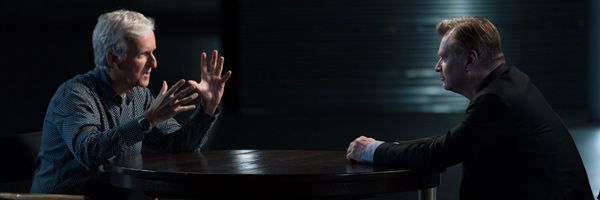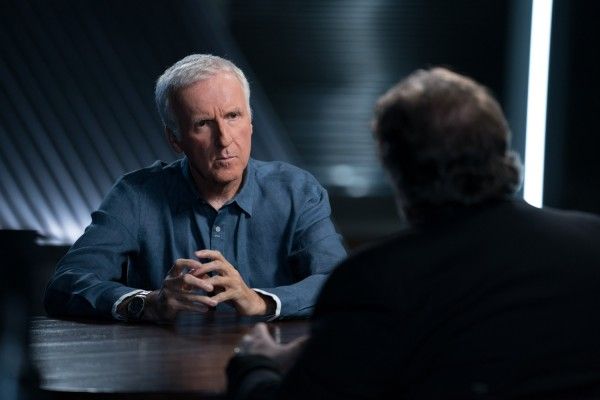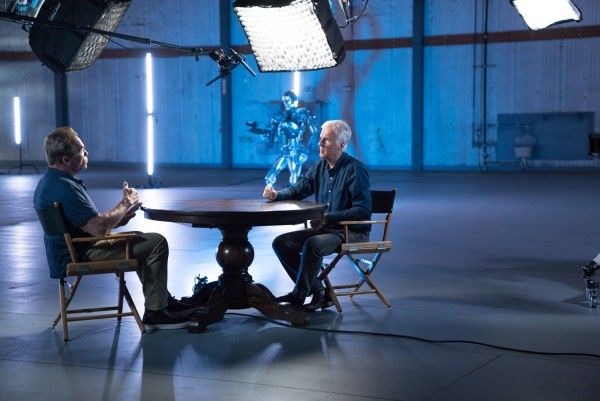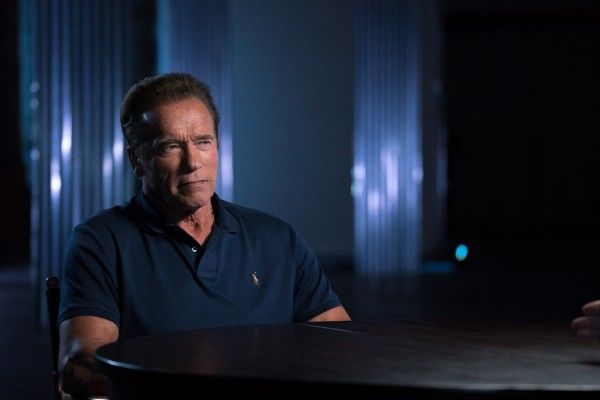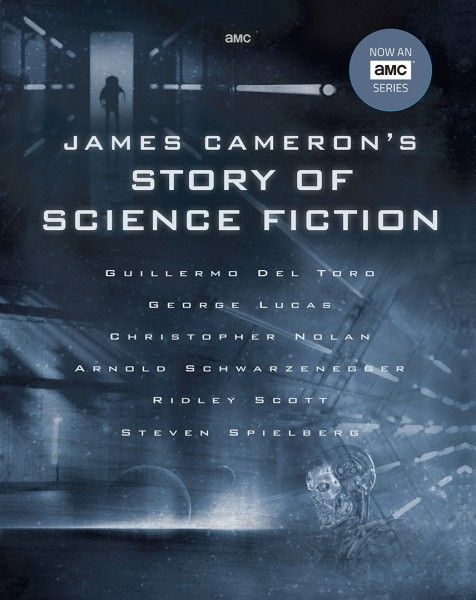The latest installment in AMC Visionaries, the network's year-round documentary series, brings together some of the biggest names in the history of cinema to talk about their most iconic works. James Cameron’s Story of Science Fiction is described as "a uniquely intimate, insiders' look at the origins of the genre that has become a cornerstone of popular culture." The six-part television series sees Oscar-winning writer, director and producer James Cameron exploring science fiction’s past, present, and future, along with our fascination with its ideas, through interviews with genre-defining talent like Steven Spielberg, George Lucas, Guillermo del Toro, Ridley Scott, Christopher Nolan, Arnold Schwarzenegger, Will Smith and Sigourney Weaver. In addition to the star-studded series' stellar guests, the show features some 100 other experts in their fields who weigh in on various aspects of science fiction. It's touted as a journey of discovery and exploration that helps us to understand where science fiction’s ideas came from and where they’re taking us.
The first episode of James Cameron's Story of Science Fiction airs tonight on AMC at 10pm and it features Cameron in a 1-on-1 with Spielberg himself to talk about the acclaimed director's films Close Encounters of the Third Kind, E.T. the Extra-Terrestrial, and War of the Worlds, in addition to sci-fi in general and what it means to him. Along the way, subtopics like the nature of alien life, what their manner of arrival might be if and when they come to Earth, and how that would change life as we know it are also explored through commentary from guests like Arrival screenwriter Eric Heisserer; sci-fi authors like Ken Liu, Ted Chiang, Nnedi Okorafor, Nalo Hopkinson, and N.K. Jemisin; and sci-fi film consultants like Jurassic Park's paleontologist Jack Horner, Contact's planetary scientist Carolyn Porco, and Avatar and John Carter linguist Paul Frommer. This mini-series is a deep dive into what makes science-fiction such an eternally engaging genre that changes as time marches on in order to reflect contemporary society and cutting-edge science.
The only downside here is that there is just so much content to cover that Story of Science Fiction has to make a choice: Hit everything it can in the time it has, or slow down to really drive home some solid thinking points for a few focused topics. It chooses to do the former, crunching down the many and varied aspects of "Alien Life" into a 45-minute conversation with literally dozens of filmmakers, media veterans, authors, experts in their fields, actors, and even voices from beyond thanks to archival footage. This is a "blink and you'll miss it" approach; I had to pause a number of times to catch an obscure movie title being referenced or note the field of study of an expert who suddenly came up on screen. The good news is that this series, judging only from episode one, throws a lot of information at you to absorb and digest, which helps to strengthen your understanding of the long and storied history of sci-fi; the bad(ish) news is that you may have to rewind or watch it again in order to let it all sink in.
Just how extensive is James Cameron's Story of Science Fiction? In the first episode alone, it would have been enough just to talk to Spielberg about his three most famous alien movies. Or it would have been enough to chat with Ridley Scott about the iconic designs of H.R. Giger and their role in the creation of the Alien franchise creatures. Or the alien invasion sub-genre of films made famous by movies as varied in time, space, and presentation as 1951's The Thing from Another World, to Invasion of the Body Snatchers, to the White House-destroying Independence Day. Or the difficulties of communicating with a truly alien species when we already have so many problems communicating with other members of our own species, as represented by films like Arrival or the adaptations of Stanislav Lem's Solaris or Arthur C. Clarke's Childhood's End. Or even the use of aliens as stand-ins for the marginalized in our own society, those taking the brunt of oppression and exploitation, as seen in Avatar and District 9. Instead, the first 45-minute episode tackles all of these things in a slightly deeper than superficial way; it's a great introduction that gives viewers plenty of avenues to seek out should they want to know more. (Like checking out Insight Edition's book by the same name.)
Whether you're a casual fan of sci-fi or a die-hard devotee, and whether you're generally aware of sci-fi's existence in the film world or have seen anything and everything remotely resembling that genre, AMC Visionaries: James Cameron's Story of Science Fiction is well worth your time and attention.
★★★★ Very good
Here's a look at the episodes airing on AMC Monday nights, starting tonight at 10pm:
EPISODE 1: ALIEN LIFE
Science fiction is filled with explorations of alien life. What can aliens teach us about what it means to be human?
Aliens from other worlds have been a staple of science fiction since H.G. Wells first popularized the idea of Martians in The War of the Worlds. Whether they truly exist is an open question, but there’s no denying the fact that aliens have been objects of both fascination and fear ever since — from Close Encounters to Independence Day. Science fiction has used aliens as metaphors to explore powerful ideas about communication, colonization, politics, power — and our treatment of each other.
EPISODE 2: SPACE EXPLORATION
Will we ever travel to the stars, the way science fiction has imagined?
For many, science fiction and rocket ships are two sides of the same coin. Ever since H.G. Wells and Jules Verne, traveling to the stars and beyond has been a central theme – and promise — of science fiction. Writers such as Arthur C. Clarke, Robert Heinlein, and Ray Bradbury ran with these ideas and laid the groundwork for modern franchises like Star Trek and Star Wars. What’s out there waiting for us – and how will the discoveries of outer space change who we are?
EPISODE 3: MONSTERS
What makes us afraid — and why do we like it so much?
Science fiction monsters allow us to explore the dark parts of ourselves – parts that we may not want to admit even exist. These science-based monsters reduce our fears — of the unknown, of transgressing, of others — to a visible, visceral presence. And, in fact, science fiction owes its existence to monsters: Mary Shelley’s Frankenstein is widely recognized as the first work to explore science and its impact on society. From Godzilla to Jurassic Park, The Thing to Stranger Things, we explore how science fiction has harnessed the power of fear.
EPISODE 4: DARK FUTURES
What happens — when the world goes to hell?
For many, science fiction and rocket ships are two sides of the same coin. Ever since H.G. Wells and Jules Verne, traveling to the stars and beyond has been a central theme – and promise — of science fiction. Writers such as Arthur C. Clarke, Robert Heinlein, and Ray Bradbury ran with these ideas and laid the groundwork for modern franchises like Star Trek and Star Wars. What’s out there waiting for us – and how will the discoveries of outer space change who we are?
EPISODE 5: INTELLIGENT MACHINES
Will the smart machines of the future save humankind — or lead to our demise?
Science fiction robots are the mobile embodiment of a fascinating idea: artificial intelligence. Despite dire warnings from people such as Stephen Hawking and Elon Musk, AI is an idea that holds out promise and peril in equal measure. From the earliest days of science fiction [Metropolis] to landmarks in cinema [The Terminator] to the latest box-office hits [Her], this is a well that the genre returns to again and again. And for good reason: these once-fanciful, and possibly threatening, technologies no longer feel quite so distant.
EPISODE 6: TIME TRAVEL
Can we travel through time — and if so, is it possible to change our fate?
Time travel is one of the most compelling and tantalizing ideas in science fiction. H.G. Wells singlehandedly invented the concept of a machine to travel through time in The Time Machine, and ever since, writers and filmmakers have explored its possibilities, pitfalls, and paradoxes. Are there multiple futures? Can we change our fate? Or are we puppets of an inviolable timeline? From Back to the Future to Interstellar to The Terminator, we explore these heady ideas — and grapple with the questions they raise.

